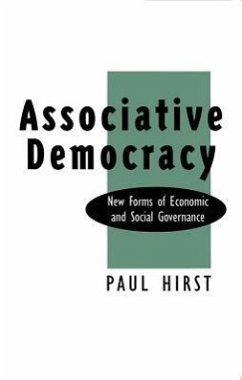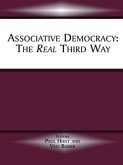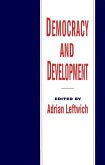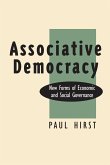Western societies are suffering from a multi-faceted political and economic crisis to which traditional ideologies of the Left and Right no longer offer viable solutions. This book advocates as an alternative 'associative democracy'. Far from being a utopian idea, it offers new forms of economic and social governance as supplements to representative democracy and market economies. Associative democracy addresses the problems of the overload of big government by democratizing and empowering civil society. It transfers social provision to self-governing voluntary associations, whilst retaining public funding and political accountability. It 'publicises' civil society, placing political responsibility and governmental tasks in the hands of citizens. Accountable government becomes possible because service performance and public control are separated. In the economic sphere it advocates regional economic regulation through public-private partnerships, the promotion of self-governing industrial districts, and the democratization of the firm. In this way, Hirst argues, public regulation can be made less remote, promoting the growth of relationships based on co-operation and trust and, therefore, ensuring those flows of information and commitment on the part of actors necessary to the pursuit of "quality" in market economies. This book is highly distinctive in the way it combines political theory with social analysis and political advocacy. It forms an outstanding contribution to contemporary political discussion.
'Who speaks against democracy? No one. But unthinking consensus isa danger; turning a still novel concept into a received idea. Bycontrast Paul Hirst shows how difficult and important the term is,how contested its content still remains, and how significant areits links to the economy as well as the polity. His major studyconfirms that democracy has only just arrived. AssociativeDemocracy will be a benchmark for the debate over wheredemocracy can, and should, lead human society.' Anthony Barnett,Co-ordinator Charter 88
'This is an important and invigorating contribution to ongoingdebates about welfare and governance in contemporary Westernsocieties. It deserves to be widely read.' Political StudiesAssociation
'Representative government and corporate bureaucracy havedominated the 20th century. In this book Paul Hirst has the boldambition of reviving the alternative 19th century traditions ofpluralism, co-operation and voluntary association to complement ifnot replace them. But he modifies these alternatives both in theoryand by reference to recent institutional experiment. It is anattractive prospect, delineated with force and learning.' JamesCornford, Institute for Public Policy Research
'This very clearly written and original book should play a keyrole in the increasingly intense, and hopefully productive,argument about the revitalisation of democratic systems.'Sociology
'Hirst defends his proposal with commendable confidence andvigour. It has a pleasing plausibility, and it is good to seegenuinely radical suggestions being advanced at the present time.'Radical Philosophy
'... This persuasive book, ... full of sharp insights.'British Journal of Sociology
'This is an important and invigorating contribution to ongoingdebates about welfare and governance in contemporary Westernsocieties. It deserves to be widely read.' Political StudiesAssociation
'Representative government and corporate bureaucracy havedominated the 20th century. In this book Paul Hirst has the boldambition of reviving the alternative 19th century traditions ofpluralism, co-operation and voluntary association to complement ifnot replace them. But he modifies these alternatives both in theoryand by reference to recent institutional experiment. It is anattractive prospect, delineated with force and learning.' JamesCornford, Institute for Public Policy Research
'This very clearly written and original book should play a keyrole in the increasingly intense, and hopefully productive,argument about the revitalisation of democratic systems.'Sociology
'Hirst defends his proposal with commendable confidence andvigour. It has a pleasing plausibility, and it is good to seegenuinely radical suggestions being advanced at the present time.'Radical Philosophy
'... This persuasive book, ... full of sharp insights.'British Journal of Sociology








